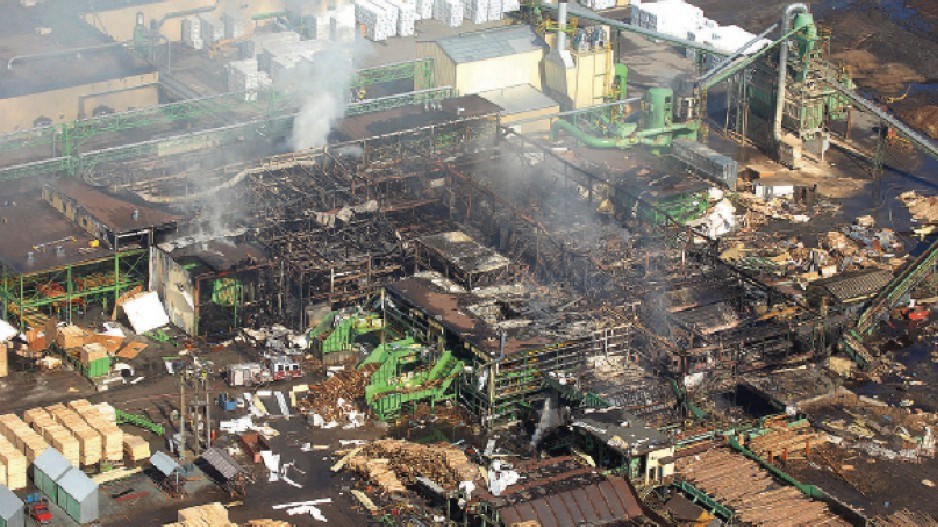The owner of a Prince George sawmill that was destroyed by an explosion and fire says the decision to rebuild it was based on several certainties – and despite one big unknown.
On April 23, 2012, two workers died and 22 others were injured when an explosion and fire destroyed Lakeland Mills in Prince George. The disaster followed a similar explosion and fire at the Babine Forest Products sawmill in Burns Lake on January 20, 2012, which killed two people and injured 20.
"We have a number of employees that were injured in the fire and explosion and continue to recover today," Greg Stewart, president of Lakeland's owner the Sinclair Group, told Business in Vancouver. "There are the physical injuries, but there are also the mental injuries, which we continue to work through."
While Hampton Affiliates, Babine's owner, announced in September 2012 that it would rebuild the Burns Lake sawmill, it has taken considerably longer for the Sinclair Group to make the final decision on Lakeland. On March 20, Stewart announced the company's plans to rebuild, with an opening date of summer 2014.
"As our employees started to stabilize, we could start to look to that rebuild decision," said Stewart. "All along we've had a strong desire to rebuild."
The company's insurance claim has now come through. Stewart said the company is also confident it has enough timber supply to run the mill, because it holds 750,000 cubic metres of timber in volume-based tenures. Many of its employees are ready to return to work.
But WorksafeBC's investigation of the accident presents a huge unknown for the company. After investigating both the Burns Lake and Lakeland accidents, the safety organization decided to forward evidence to Crown prosecutors.
WorkSafeBC can impose administrative penalties under the Workers Compensation Act, and fines up to $594,000 for a first offence can be imposed on companies. The courts can impose higher fines of $652,000, but they can also impose prison terms and fine individual employees.
A WorkSafeBC spokesman told BIV that the organization is still putting together documents to forward to the Crown but expects to be ready to submit its evidence within the year.
The decision has created uncertainty for Lakeland and its employees, said Frank Everitt, president of the United Steelworkers Union local in Prince George.
"In my mind, if we had the results of what WorkSafeBC is supposed to be doing, we'd have some good direction for everybody to focus on," said Everitt. "We certainly don't have that clear direction from them."
Stewart said that initially, the company was waiting for the results of the investigation before proceeding with a rebuild.
"In absence of that information, we have to push forward and make sure that we do what we need for our business."
Stewart added that the Sinclair Group is doing its best to focus on making the new mill as safe as possible. He said the rebuilt facility will have equipment that "will address the dust issue," but declined to give details because the matter is before the courts.
The company is also looking at ways to reduce and monitor hazards from methane.
WorkSafeBC inspection reports show that inspectors had flagged "hazardous amounts of wood dust" at the mill as recently as February 2012. Lab test results released by WorkSafeBC in April 2012 showed that very dry dust from pine beetle-killed lumber could be more explosive than other kinds of wood dust. •
Strong timber supply for Lakeland
With 750,000 cubic metres of volume-based tenure available to the company, the Sinclair Group – which is owned by local Prince George companies Robert Stewart Holdings and Ivan Anderson Holdings, as well as Canfor – is confident it has a large enough timber supply to feed the mill.
The Sinclair Group's faith in the timber supply for Lakeland contrasts with Hampton Affiliates' concerns about the wood available to Babine Forest Products. Hampton had to work out a special deal with the Minister of Forests, which committed to help the company find more timber, before it would commit to rebuilding.
Much of the Sinclair Group's wood has been affected by the pine beetle, which Stewart said presented "a bit of an unknown." But he said technological advances, such as better scanning and categorizing tools, make it possible to get more value out of beetle-kill.
The conclusion of the special committee on timber supply, which held public consultations in the summer of 2012 to try to find solutions to the pine beetle crisis, was also important. Stewart said the company was heartened by the committee's recommendations.




